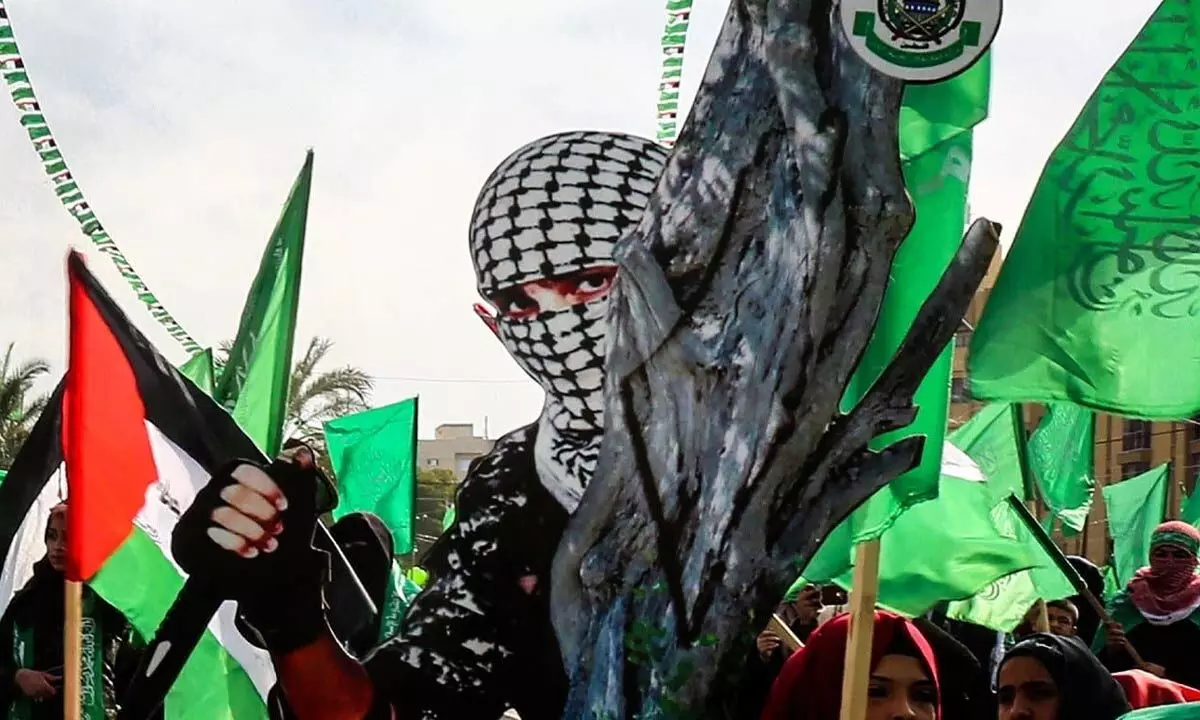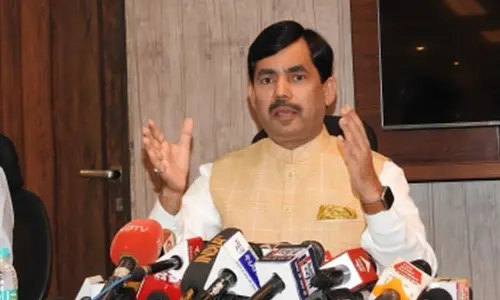Radicalisation behind Hamas attack

The ‘terrorist’ character of the elaborately planned cross-border attack on Israel by Hamas cannot be defended on political grounds of Israeli ‘high-handedness’ in Gaza and West Bank and the long history of ‘wars’ and violent clashes between Israel and Palestine.
The ‘terrorist’ character of the elaborately planned cross-border attack on Israel by Hamas cannot be defended on political grounds of Israeli ‘high-handedness’ in Gaza and West Bank and the long history of ‘wars’ and violent clashes between Israel and Palestine.
The attack is Israel’s 9/11 or 26/11 in terms of mobilisation of militants and war material, timing of the offensive to coincide with the weeklong celebration of Sukkot, the nation’s most important festival and use of the big scale rocket firing from Gaza as a ‘cover’ by the terrorists to physically cross into Israel to cause devastation in the border belt by indiscriminately targeting the civilian population including women and children and even taking them hostage in large numbers.
Terrorism is a covertly planned attack and technical surveillance of communications of the leaders of terror outfits, by itself may not provide a clue to what was in the offing.
Hamas was originally in the class of Islamist organisations represented by Ikhwanul Musalmeen (Muslim Brotherhood) that had begun in Syria and Egypt to oppose the pro- Left and secular regimes of Hafiz al Assad and Gamal Abdul Nasser and call for establishment of an Islamic rule. It termed Quran as the best Constitution and professed that sovereignty belongs only to Allah.
Its political stance pleased the West. Its descendant in South Asia was the Jamaat-e-Islami founded by Maulana Abul Ala Maudoodi which remained in the good books of the British in the run-up to Independence and became an advocate of the Sharia- based rule in Pakistan. Jamaat became the main instrument of Nizam-e-Mustafa declared by Gen Ziaul Haq.
Hamas was established in Palestine in the 80s as an off-spring of Palestinian Branch of Muslim Brotherhood with its ideological affiliation with the Jamaat as well and intrinsic opposition to the secular Palestine Liberation Organization (PLO) led by Yassir Arafat.
Pakistan meanwhile had led the anti-Soviet armed campaign in Afghanistan on the war cry of Jihad using the Jamaat’s Hizbul Mujahideen (HuM) and Saudi funded Lashkar-e-Taiba (LeT) as its main weapons. Al Qaeda and its affiliate Taliban also joined in at the instance of Pakistan and when the first Emirate was established at Kabul in 1996 with the full support of Pakistan, all outfits wedded to Islam were happy. Pakistan managed to get recognition of the Emirate from Saudi Arabia and the UAE, who were otherwise quite distrustful of radicals.
Mullah Omar, the Emir of Afghanistan, was a close relative of Osama bin Laden. It so happened that the Taliban being the product of the ‘Wahhabi’ revolt of the 19th Century against the British on the Indian subcontinent, carried an anti-West legacy and soon ran into a conflict with the US. The latter was compelled to work for the ouster of the Kabul Emirate and that laid the groundwork for 9/11.
A developing rapport between the Islamic regime and the radicals in Pakistan because of the appeal that the revivalist call of the latter to go back to the puritan Islam of the days of Pious Caliphs, held for Muslims generally, spread of ‘radicalisation’ in countries such as Yemen, Qatar, Syria, Iraq, Turkey, Malaysia and Afghanistan besides Pakistan and a shrinking of influence of Saudi Arabia in the Organisation of Islamic Conference (OIC) because of its continuing deep alliance with US, have been the glaring features of the Muslim world ever since.
The unleashing of terrorist violence by Hamas has to be seen in the backdrop of the growing radicalisation in the Muslim world that takes into its sweep of indoctrination not only discontented youth but even the thinking Muslims by spreading the belief that deviation from the ‘golden period’ of Islam was responsible for all the ills of the Muslim societies. The radicals alleged that the overbearing policies of US and its allies put Islam in danger and that the situation demanded recourse to jihad.
Increasing control of Israel the closest ally of US, on Al Aqsa mosque in Jerusalem which is the third holiest place for Muslims -- adjoining the Western Wall on Temple Mount, the holiest site of Jews -- has made it easy for Hamas to make it a fight for ‘faith’. Exclusivism of Islam and the pull of supremacy that this faith exercised on its followers carried the potential for creating a ‘war of religions’.
Politically this is generating a sentiment against the US-led West and marking out countries like Saudi Arabia, the UAE and Egypt, who had been keeping up good relations with the US-as the opponents of radicalisation.
In a bird’s eye view the geopolitical divide between US-led West representing the democratic order and the world of autocratic regimes could be getting stronger. India’s natural place is with the former particularly because of the reality of Sino-Pak axis working against India and the threat of cross border terrorism involving both radicals and other Pak-ISI linked militant outfits showing no signs of decline.
Those finding fault with Israel for creating conditions that led to the attack, discard outright the suggestion made by US and others that there should be two states - Palestine and Israel - in the region. They advised India not to ‘weaken’ its friendship with the Arab world but disregarded the fact that India’s relations with Saudi Arabia, UAE and Egypt are now elevated to the level of strategic partnership. The world today needs international relations based not on considerations of religion but of global security and economic advancement. The Delhi summit of G20 under India’s Presidency clearly established this vision.
Terrorism driven by the motivation rooted in notions of supremacism of ‘faith’ can be deadly and can never be supported as a means for achieving political settlements. Shia extremism under the Ayatollahs of Iran is against US and Western Capitalism and is on the same side of the fence as Sunni radicals in so far as their hostility towards West was concerned. Islamic militants had taken on the powerful Soviet army in Afghanistan once and they could hold on against Israel in an asymmetric warfare mode. The Israel- Hamas conflict may proceed on an unchartered course. Already some 2500 people on both sides lost their lives and nearly 4000 were injured in the first three days of the conflict.
India is firm against acts of terrorism but it would be interested in a settlement of the political dispute between Palestinians and Israel. A major issue would be to evolve an adjustment about worship at Al Aqsa mosque being allowed in a regulated manner while the identity of Temple Mount was secured without any reservations from the Arab side. Ukraine-Russia confrontation was triggered by conflict of political ideology but Hamas- Israel violent face off is primarily anchored on causes concerned more with religion than with political identities of Palestine and Israel. These developments can adversely affect both global security and world economy. India’s dictum that ‘this is not an era of war’ should be heeded and restoration of peace between Israel and Palestinian Authority negotiated on the basis of acceptance of the idea of two states living in peaceful coexistence.
Projection of Islam as a peace-loving religion is put to test and it has to be seen if Israel’s existence would be acknowledged by the Muslim world paving the way for the enlargement of Abraham Accord presently being worked out between Saudi Arabia, the UAE and Israel.
(The writer is a former Director Intelligence Bureau)










